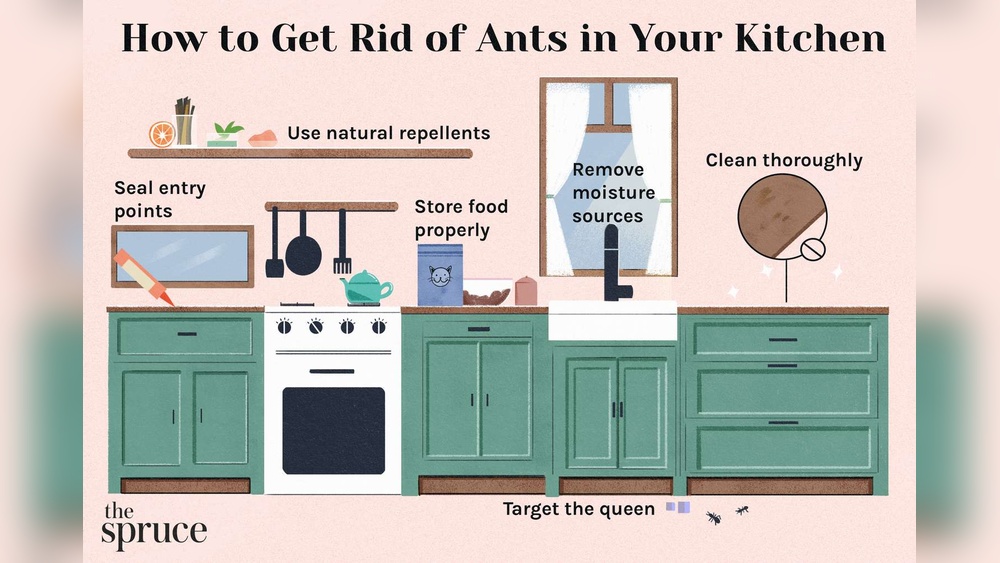Are tiny ants invading your kitchen and driving you crazy? You’re not alone.
Those little black ants seem harmless at first, but once they find a food source, they multiply quickly and become a persistent nuisance. If you’ve been wondering how to get rid of tiny ants in your kitchen for good, this guide is made just for you.
You’ll discover easy, effective steps you can take right now to stop ants from marching across your counters and spoiling your peace of mind. Keep reading, and say goodbye to those unwanted kitchen guests!

Why Tiny Ants Invade Kitchens
Tiny ants invade kitchens mainly because of easy access to food. They are especially drawn to sugary crumbs, grease spots, and open containers. Any small spill can attract them quickly. Even sealed packages can sometimes be penetrated if the ants find a weak spot.
Common food sources include sweets, leftover pet food, and sticky residues on counters. Ants also seek out moisture, so wet areas near sinks or leaky pipes can be attractive. Keeping these spots clean can reduce their interest.
Attractants in kitchens are not just food but also warmth and shelter. The kitchen offers a cozy environment for ants to build nests and stay protected from weather changes.
Entry points for ants are tiny cracks, gaps around windows and doors, and spaces in walls. They use these hidden paths to sneak inside unnoticed. Sealing these openings with caulk or weatherstripping helps keep ants out.
Identifying Ant Trails And Nests
To find ant trails, watch where tiny ants walk in the kitchen. They often follow the same path to food or water. Trails look like a thin line of ants moving in a row.
Tracking ant movement helps find their nest. Ants go back and forth from food to nest many times. Follow the trail carefully to see where it ends.
Signs of nest locations include small holes in walls, cracks, or hidden places near the kitchen. Nests may be under the sink, behind appliances, or inside cupboards.
Look for piles of tiny dirt or sand near walls or floors. These piles show where ants dig their homes. You may also hear faint rustling sounds from nests inside walls.
Checking these signs helps you locate and clean ant nests to stop the problem faster.
Natural Remedies To Repel Ants
Vinegar solutions are great for repelling tiny ants. Mix equal parts white vinegar and water in a spray bottle. Spray this mixture on ant entry points like doorways and windowsills. The strong smell masks ant scent trails, confusing them. This helps stop ants from finding food. The effect lasts a few hours, so reapply often. Vinegar does not kill ants but keeps them away temporarily.
Essential oils and herbs can also repel ants naturally. Oils like peppermint, tea tree, and eucalyptus have strong smells ants dislike. Mix a few drops with water and spray around the kitchen. Fresh herbs such as bay leaves, mint, and rosemary placed near entry points help too. Their scents act as natural barriers to ants.
| DIY Ant Repellent Sprays | How to Use |
|---|---|
| Vinegar Solution | Mix equal parts vinegar and water. Spray on ant paths and entry spots. |
| Essential Oil Spray | Add 10 drops peppermint or eucalyptus oil to water. Spray kitchen edges. |
| Herbal Barrier | Place fresh mint, rosemary, or bay leaves near doors and windows. |

Effective Cleaning Practices
Removing food crumbs is essential to keep tiny ants away. Clean all kitchen surfaces and floors thoroughly every day. Use a damp cloth or mop to wipe crumbs from counters, tables, and floors. Avoid leaving food exposed. Store snacks and sweets in sealed containers to prevent ants from finding them.
Sanitizing surfaces helps kill germs and removes ant trails. Use a mild cleaner or vinegar solution to wipe down countertops, sinks, and cabinet handles. Pay special attention to sticky spots where ants gather. Regular cleaning reduces the chance of ants returning.
Disrupting pheromone trails confuses ants and stops them from following each other. Spray vinegar or soapy water along ant paths, doorways, and windowsills. These sprays mask the scent trails ants use to find food. Reapply often to keep ants from returning.
Sealing Entry Points
Check all doors and windows carefully for small cracks. Ants use these tiny gaps to enter your kitchen. Look along the edges and corners where the frame meets the wall. Use a flashlight if needed.
Apply caulking to seal cracks and holes around doors and windows. This stops ants from sneaking inside. Choose a caulk that is waterproof and durable. Apply it neatly to block every visible gap.
Use weatherstripping on door bottoms and window sashes. It creates a tight seal that blocks ants and cold air. Replace old or worn weatherstripping to keep entry points fully closed. This also helps save energy.
Commercial Ant Control Options
Safe ant baits and traps attract ants with food lures. Ants carry poison back to their nests. This kills the entire colony over time. These products are safer than spraying chemicals everywhere. Place baits near ant trails and kitchen edges. Check and replace them often for best results.
When to use pesticides depends on how bad the ant problem is. Use pesticides only if baits and traps do not work. Choose products made for indoor use and follow instructions carefully. Avoid spraying near food, children, and pets. Pesticides can kill ants quickly but may not stop new ants from coming.
Preventing Future Ant Infestations
Store food in sealed containers to stop ants from smelling it. Keep fruits and snacks in the fridge or airtight jars. Clean up crumbs and spills immediately to remove any ant attractants. Avoid leaving dirty dishes in the sink for long periods.
Check your kitchen regularly for small cracks or holes where ants can enter. Seal these gaps with caulk or weather-stripping. Look behind appliances and under sinks to find hidden entry points. Regularly sweep and mop floors to remove food particles.
| Food Storage Tips | Maintenance Checks |
|---|---|
| Use airtight containers for all dry foods | Inspect door and window seals monthly |
| Keep countertops clean and dry | Look for ant trails around baseboards |
| Store pet food in sealed bins | Check for leaks or moisture buildup |
:max_bytes(150000):strip_icc()/TheSpruce_Howtogetridofandpreventodoroushouseants_colorv1-d55f1b3ffb8f44e1a34ba6d0a07bd4a0.png)
Frequently Asked Questions
Why Do I Get Tiny Ants In My Kitchen?
Tiny ants enter kitchens searching for food, especially sugary or greasy crumbs and spills. They follow scent trails to access these sources.
How Long Will Vinegar Keep Ants Away?
Vinegar keeps ants away only while its strong smell lasts, usually a few hours to a couple of days. Reapply regularly for continued effect.
How Do I Find Out Where Ants Are Coming From In My Kitchen?
Trace ants by following their trail from food sources to entry points. Check cracks, windows, and baseboards for nests or openings. Clean surfaces to reveal paths and identify where ants enter your kitchen.
How Do I Get Rid Of Little Ants On My Kitchen Counter?
Clean counters thoroughly to remove food crumbs and spills. Spray vinegar-water solution on ants and entry points. Seal cracks to block access. Use ant baits for lasting control. Maintain cleanliness to prevent return.
Conclusion
Tiny ants in the kitchen can be frustrating to handle. Keep your kitchen clean and dry to stop ants from coming. Seal food containers tightly and wipe up crumbs quickly. Use natural solutions like vinegar to disrupt their trails. Check and close entry points to block ants from entering.
Regular cleaning and monitoring help prevent new infestations. Patience and consistency are key to keeping ants away for good. Stay vigilant, and your kitchen will stay ant-free.

Yes, working as , Food Blogger and Product Reviewer for last 6 years. Here you will get amazing deals for Smart kitchen products. I am your best source for the latest update in cooking trends. I provide insightful articles, reviews, and analysis on cutting-edge kitchen gadget. My mission is to empower readers with the knowledge they need to stay ahead in a rapidly evolving coking world. Join me as we explore the future of food technology and how it shapes our lives today and tomorrow.





